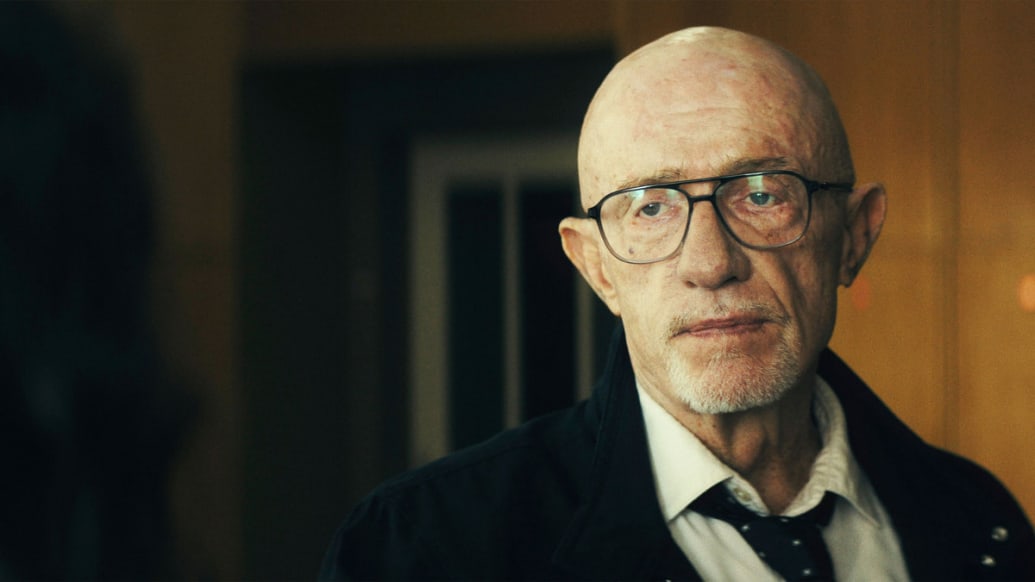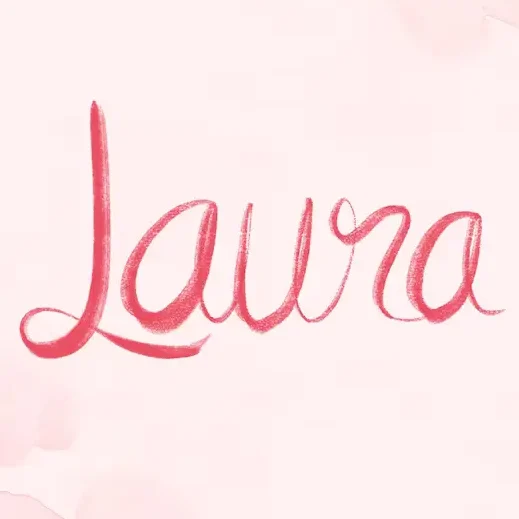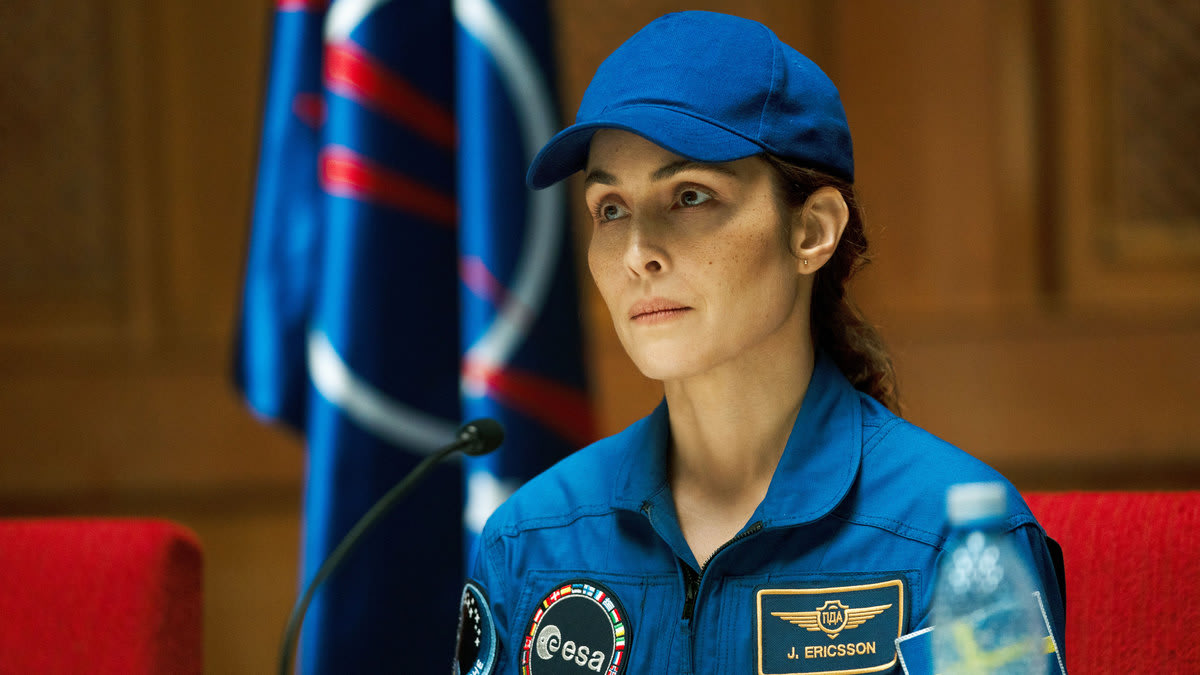Doppelgangers, specters, and mirrored realities all play a central role in Constellation, yet more pedestrian elements like interesting characters and intriguing storytelling are sadly missing from Apple TV+ latest serialized series, which premiered Feb. 21. A turgid sci-fi saga whose mystery is obvious from the outset—or, at least, from the moment the show stops dawdling about with its protracted prologue—it’s a head-scratcher only in the sense that it’s difficult to imagine why anyone thought that this tale required eight hours when it could have been handled by a two-hour feature. When streaming services inevitably start cutting back on original productions, meandering and mundane ventures such as this will be first on the chopping block.
Aboard the International Space Station, astronaut Jo (Noomi Rapace) FaceTimes with her daughter Alice (Rosie and Davina Coleman), giving her a tour of the zero-gravity environment she’s called home for the past year. At the moment Jo turns her camera toward comrade Paul (William Catlett), he activates a top-secret experimental NASA gizmo known as the CAL (for “Cold Atomic Lab”) and the ISS is suddenly struck by an unknown object that wreaks havoc on its life support systems. Since Jo was already scheduled to embark on a spacewalk that day, she heads outside and locates the cause of their calamity: a desiccated corpse in an orange USSR cosmonaut suit from decades earlier. This is totally inexplicable, and to make matters worse for Jo, there are no cameras capturing this discovery, and the body floats away before she can corral it to show to others.
During this disaster, Paul is fatally injured, and with just one working escape capsule, Joe sends her fellow astronauts back to Earth and stays aboard the ISS to fix the remaining pod. As she endeavors to get herself off the station, Jo sees and hears various incomprehensible things (some involving Paul). She’s also ordered to recover the CAL by Henry Caldera (Jonathan Banks), the chief scientific consultant at Rocket Propulsion Laboratories, who’s convinced that during its few seconds of operation, the device succeeded in finding a new form of matter. Constellation spends the majority of its first one and a half episodes watching Jo tinker with batteries and cables in an effort to depart the ISS, thereby immediately establishing that showrunner Peter Harness’ narrative has been distended to laughable lengths.
The fact that this footage is occasionally broken up by five-weeks-later action on Earth does little to mitigate its torpor. In those future passages, Jo and Alice venture into the dark snowy Swedish woods. Along this trek, Jo listens to static-y astronaut recordings on a Fisher Price tape deck that will figure prominently into the ensuing proceedings, and she hears—and then comes face-to-face with—another Alice in a flip-side version of the cabin at which they’re residing. This is the beginning of hours upon hours of hearing Alice cry out “Mamma!” while making a sad face that is her sole expression. Though this ghostly stuff is initially perplexing, everything comes into focus in rather short order, what with Jo telling Alice that she doesn’t smell like she used to, and Alice remarking that her mom seems different, and Jo’s husband Magnus (James D’Arcy) acting more than a bit surprised by his spouse’s warmth toward him.
(Warning: Spoilers ahead.)
Between these numerous baffling developments, as well as incessant shots of characters doubled in mirrors, comments about the world being upside-down, strange encounters with alternate loved ones, and Henry providing a handy primer on quantum physics—and its contention that two objects, one light and one dark, can be in the same place at the same time—it’s quickly clear that Constellation is a work of multiverse fiction. Nonetheless, it strives to confound viewers by endlessly teasing this fact, including via sequences that concern Henry’s “brother” Bud (also Banks), a former astronaut bitter about a decades-old space disaster that he survived but which took the life of his colleagues, and which a reporter continues to claim is an event about which Bud is lying. Given that Henry is also a former astronaut who experienced a similar return-to-Earth incident except minus the fatalities, it’s easy to put two and two together and deduce the actual nature of their relationship.

Rapace looks haunted, frantic, and shaken throughout, yet Jo is never an engaging protagonist; she’s merely one of several pawns that Constellation asks us to care about without first providing an adequate reason to do so. Banks is undercut by the show’s early need to keep Henry’s fundamental condition a secret, which means he’s simply an opaque and somewhat downcast guy yelling about the CAL and its habit of producing results that he alone is capable of witnessing. In its back half, the material gives him more colorful things to do, but by that point everything has become such a slog that it’s far too little, too late. The rest of the cast, meanwhile, are rendered in one dimension, with Magnus the wet-noodle spouse who’s always one step behind everyone else, and Alice the mopey little girl who’s always hiding in cupboards (of which there are so, so many).
Constellation is all about the “liminal space” between two distinct-yet-conjoined realities, and also about setting up rules (i.e., this quantum-physics phenomenon happens to astronauts) and then violating them without explanation (namely, adolescent Alice can also view and visit both worlds). More frustrating than its inconsistency, however, is its lethargy. Every other scene is superfluous, and the slowness with which it builds out its drama is so egregious that it comes across as a case study in time-padding. Whole episodes could be excised without any appreciable effect on the overall story, whose convolutions are less mystifying than is the decision to spend this much energy on them. Even once it stops playing coy and gets down to business, it winds up making little sense, delivering twists that only raise additional questions about how any of this works, what caused it to happen, and why we should care. At the end, it hints at a Season 2 with more answers, but in light of this debut run’s dullness, that ultimately feels like cold comfort.

Laura Davis is an entertainment aficionado who delves into the glitz and glamour of the entertainment industry. From Hollywood to Broadway, she offers readers an insider’s perspective on the world of movies, music, and pop culture.








